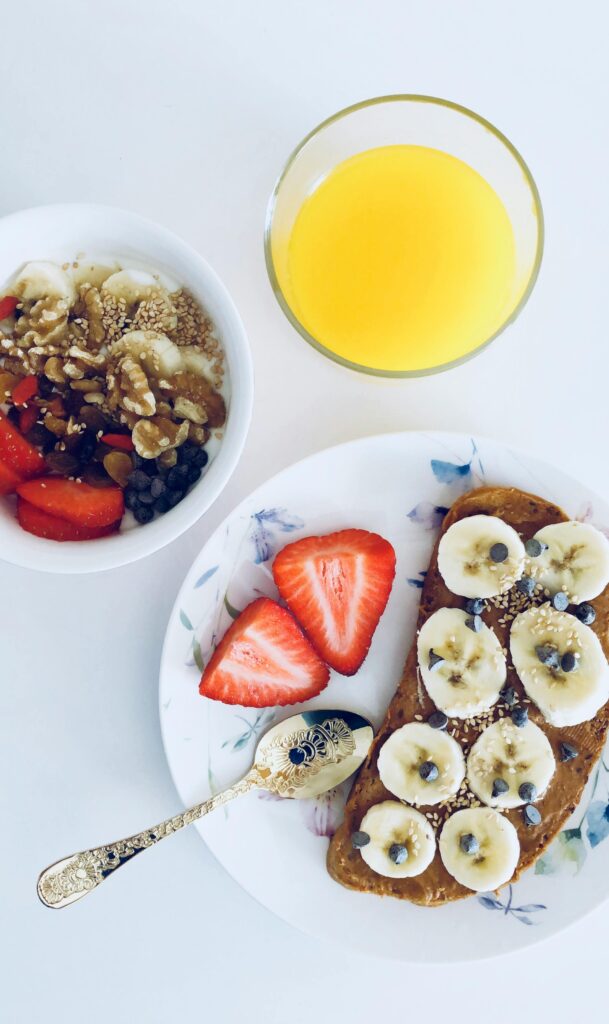
Whether you’re a seasoned athlete or just beginning your fitness journey, nutrition plays a vital role in your performance and recovery. What you eat before and after a workout can significantly impact your energy levels, endurance, muscle growth, and overall well-being. So, how do you fuel your body correctly to achieve your fitness goals? Let’s explore the best pre-workout and post-workout meals to ensure you get the most out of your training sessions.
1. Why Nutrition Matters in Exercise
Before diving into specific foods, it’s essential to understand why nutrition is so crucial in the context of exercise. When you work out, your body uses glycogen—a stored form of carbohydrate—as a primary energy source. Additionally, during intense exercise, your muscles undergo stress and minor damage, which requires nutrients to repair and grow stronger.
To support these processes, your body needs the right balance of carbohydrates, proteins, and fats at different times. Proper nutrition can help you:
- Boost energy levels and prevent fatigue.
- Enhance endurance and strength.
- Speed up muscle recovery and reduce soreness.
- Improve overall athletic performance.
Now, let’s break down what to eat before and after your workout to reap these benefits.
2. What to Eat Before a Workout: Fueling Your Body for Success

A well-planned pre-workout meal is essential to maximize your exercise performance. The goal is to consume foods that provide a steady release of energy and support endurance.
A. The Ideal Pre-Workout Nutrients
- Carbohydrates: Carbs are the body’s preferred energy source during exercise. They provide glucose, which fuels your muscles and brain. Aim for complex carbohydrates like whole grains, oats, or sweet potatoes, which release energy slowly, keeping you fueled throughout your workout.
- Proteins: While carbs are the star of pre-workout meals, adding some protein can help maintain muscle mass and promote muscle repair during exercise. Choose lean proteins like chicken, turkey, or plant-based options like lentils or tofu.
- Fats: Healthy fats, such as those found in avocados, nuts, and seeds, provide long-lasting energy. However, consuming too much fat before a workout can cause discomfort, so it’s best to keep it moderate.
B. Timing Your Pre-Workout Meal
The timing of your pre-workout meal is crucial. Ideally, you should eat a balanced meal 2-3 hours before exercising. This allows your body enough time to digest the food and convert it into usable energy. If you’re short on time, a smaller snack 30-60 minutes before your workout can also help.
C. Examples of Pre-Workout Meals
Here are some excellent options for pre-workout meals:
- Oatmeal with Fruits and Nuts: A bowl of oatmeal topped with banana slices, berries, and a sprinkle of chia seeds provides complex carbs, fiber, and healthy fats.
- Whole Wheat Toast with Peanut Butter and Banana: This quick meal offers a good balance of carbs, protein, and healthy fats.
- Greek Yogurt with Honey and Berries: Greek yogurt is rich in protein, and the honey provides a quick source of carbs, while the berries add antioxidants.
- Chicken and Brown Rice with Vegetables: A more substantial meal option that combines lean protein, complex carbs, and fiber.
3. What to Avoid Before a Workout
While it’s essential to focus on what to eat, it’s also important to know what to avoid before a workout:
- High-Fat Foods: Foods high in fat can slow down digestion and make you feel sluggish or uncomfortable.
- Sugary Snacks: While a quick sugar fix might seem tempting, it can cause a spike in blood sugar followed by a crash, leading to fatigue.
- Large Meals: Eating a large meal right before a workout can cause bloating, cramping, or nausea.
4. What to Eat After a Workout: Nourishing Your Body for Recovery
After a workout, your body is in recovery mode, needing nutrients to repair muscles, replenish glycogen stores, and rehydrate. Your post-workout meal should focus on two primary nutrients: protein and carbohydrates.
A. The Ideal Post-Workout Nutrients
- Protein: Consuming protein after exercise helps to repair and rebuild muscle tissue. Aim for around 20-30 grams of protein after your workout. Good sources include lean meats, fish, eggs, dairy products, or plant-based options like beans and lentils.
- Carbohydrates: Carbs are necessary to replenish the glycogen stores depleted during exercise. Pairing protein with carbs helps maximize protein synthesis and accelerate recovery. Opt for whole grains, fruits, and starchy vegetables.
- Electrolytes and Fluids: Hydration is critical, especially after intense workouts. Drinking water and consuming foods rich in electrolytes—like potassium, magnesium, and sodium—helps maintain fluid balance and prevent cramps.
B. Timing Your Post-Workout Meal
The optimal window to consume your post-workout meal is within 30 minutes to 2 hours after finishing your exercise. This is when your muscles are most receptive to absorbing nutrients.
C. Examples of Post-Workout Meals
Here are some nutrient-dense post-workout meal ideas:
- Grilled Chicken with Quinoa and Steamed Vegetables: This meal provides high-quality protein and complex carbs to help with muscle recovery.
- Protein Smoothie with Banana, Spinach, and Almond Milk: A quick and easy option that packs protein, carbs, and healthy fats.
- Scrambled Eggs with Whole Grain Toast and Avocado: Eggs offer protein and essential amino acids, while whole-grain toast provides complex carbs.
- Salmon with Sweet Potato and Asparagus: Salmon is rich in protein and omega-3 fatty acids, which have anti-inflammatory properties.
5. Foods to Avoid After a Workout
Just as with pre-workout meals, certain foods should be avoided post-workout to maximize recovery:
- High-Fat Foods: They can slow down the absorption of nutrients needed for muscle repair.
- Sugary Foods and Drinks: While they may replenish energy, they lack the nutrients necessary for muscle recovery.
- Alcohol: Alcohol can dehydrate the body and impede muscle recovery and growth.
6. Hydration: The Unsung Hero of Workout Nutrition

Hydration is often overlooked, but it’s a critical component of both pre- and post-workout nutrition. Drinking enough water before, during, and after exercise helps regulate body temperature, lubricate joints, and transport nutrients to give you energy and keep you healthy. For longer or more intense workouts, consider beverages that contain electrolytes to replace what is lost through sweat.
7. Adjusting Your Diet Based on Workout Intensity and Goals
The type of workout and your personal fitness goals can influence what you should eat before and after exercising:
- For Weight Loss: Focus on moderate portions of protein and healthy carbs to fuel your workouts and support muscle recovery while maintaining a calorie deficit.
- For Muscle Gain: Increase protein intake to support muscle synthesis and repair, and ensure you’re consuming enough calories to fuel muscle growth.
- For Endurance Training: Carbohydrates become even more crucial to maintain energy levels throughout prolonged exercise sessions. Consider carb-loading before long-distance running or cycling.
8. Special Considerations: Vegan and Vegetarian Options
If you follow a vegan or vegetarian diet, you can still get the nutrients you need for pre- and post-workout nutrition:
- Pre-Workout: Whole grains, fruits, nuts, seeds, and plant-based proteins like tofu or tempeh.
- Post-Workout: Legumes, quinoa, chia seeds, hemp seeds, and plant-based protein shakes.
9. Supplements: Do You Need Them?
Supplements like whey protein, BCAAs (branched-chain amino acids), and creatine can be beneficial, especially if you’re training at a high intensity. However, it’s essential to prioritize whole foods and use supplements to fill nutritional gaps rather than relying on them as primary sources of nutrition.
10. Conclusion: The Key to Optimal Workout Nutrition
Eating the right foods before and after a workout is essential to fuel your performance, support recovery, and achieve your fitness goals. By incorporating a balanced mix of carbohydrates, proteins, and fats, and timing your meals properly, you can optimize your body’s response to exercise. Remember, everyone is different, so listen to your body and adjust your diet based on your specific needs and goals.
By paying attention to both pre- and post-workout nutrition, you’ll not only enhance your performance but also promote long-term health and well-being. So, start fueling your workouts the right way and enjoy the benefits of a balanced fitness routine!
References
- Burke, L. M., & Hawley, J. A. (2023). Nutritional Strategies to Optimize Performance and Recovery. Sports Medicine, 52(1), 23-34.
- Jeukendrup, A., & Gleeson, M. (2023). Sport Nutrition: An Introduction to Energy Production and Performance. Human Kinetics.
- Smith, A., & Campbell, B. (2024). The Role of Hydration and Electrolyte Balance in Exercise Performance. Journal of Sports Science and Medicine, 17(2), 103-115.

